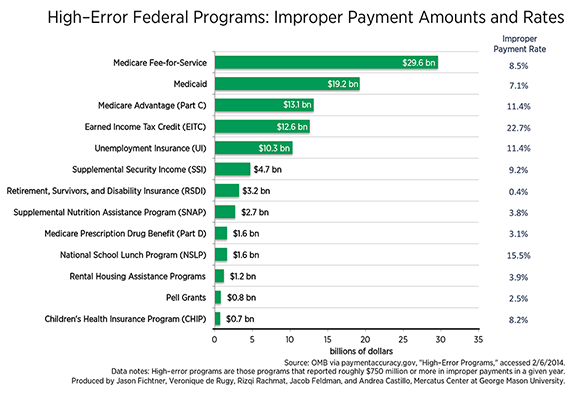- | Government Spending Government Spending
- | Data Visualizations Data Visualizations
- |
Improper Federal Payments Waste over $100 Billion in 2012
This week’s chart, which uses 2012 data from the Office of Management and Budget’s “High-Error Programs Report” to display improper payment amounts and improper payment rates of federal transfer programs, shows that over $100 billion in taxpayer funds were improperly spent in 2012.
Politicians from both sides of the aisle agree that reducing waste, fraud, and abuse of federal spending is an important and cost-saving goal. Each successive administration pledges to improve the government’s stewardship of taxpayer dollars, yet waste is never fully eradicated.
This week’s chart, which uses 2012 data from the Office of Management and Budget’s “High-Error Programs Report” to display improper payment amounts and improper payment rates of federal transfer programs, shows that over $100 billion in taxpayer funds were improperly spent in 2012.
The chart ranks transfer programs that allocate at least $750 million in payments from those with the lowest improper payments in dollars to those with the highest improper payment amounts. The chart also displays the total improper payment rates as a percentage of total program outlays for each program.
Some programs, like the Social Security Retirement, Survivors, and Disability Insurance (RSDI) programs, have improper payment amounts that are relatively high when compared to their improper payment rate. While $3.2 billion was improperly spent on Social Security benefit payments in 2012, the large overall amount of benefit payments made by the agency ($785.8 billion in 2012) means that the improper payment rate is only 0.4 percent.
Other programs, like the Earned Income Tax Credit (EITC), not only have a high improper payment amount but also a relatively high improper payment rate. The $12.6 billion in misspent EITC outlays represents a substantial portion, 22.7 percent, of total EITC spending—suggesting that the EITC is prone to fraud, waste, and abuse. As the chart displays, Medicare Advantage (Part C), Unemployment Insurance (UI), and Supplemental Security Income (SSI) face problems similar to the EITC, with anywhere approximately from one in nine to one in eleven dollars in these programs being disbursed improperly.
The three largest programs in terms of improper spending amounts are all health-care related. Medicare Fee-for-Service, Medicare Advantage (Part C), and Medicaid top the chart with a combined $61.9 billion in improper payments. As economist Timothy Taylor points out, these high improper funding amounts are of particular concern in light of the federal government’s expanded intervention in health-care markets, as improper payments may likely plague new federal health programs as well.
While people of good conscience on both sides of the political aisle can debate the merits of whether or not government should be involved in certain activities, none should tolerate the high levels of improper payments currently associated with government spending on social welfare programs. Federal spending has grown too massive to be adequately overseen. Waste, fraud, and abuse squanders public resources and undermines trust in government.


